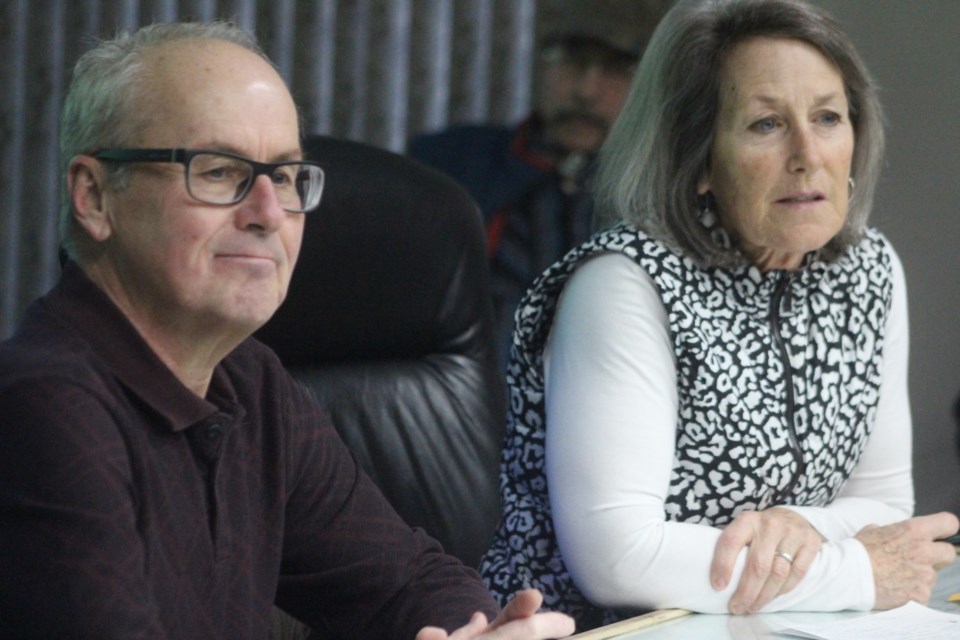BARRHEAD - By the end of September 2024, the Barrhead Community Victim Services Unit (VSU) will no longer exist as it will be amalgamated into a much larger regional organization.
That is what current VSU president Margaret Osborne and secretary Joe Zachruck told County of Barrhead councillors at their March 5 meeting.
The pair attended the meeting to update councillors on the process of amalgamating into the new and to ask the municipality for a $750 donation. Reeve Doug Drozd noted that the funds were already a line item in the 2024 budget.
VSUs are non-profit organizations that help support individuals who are the victims of crime, trauma, death or other emergencies. Most often, the VSU and its volunteer advocates are dispatched at the request of the RCMP. However, they also receive referrals from other agencies such as fire services, the Crown prosecutor's office, healthcare centres, and ambulance crews. Barrhead Community VSU unit covers the Barrhead municipalities, the Fort Assiniboine area (part of Woodlands County) and Swan Hills.
In July 2022, then-Justice Minister and Solicitor General Tyler Shandro announced that the province would enhance services available to crime victims through VSUs. One way the government planned to do that was to eliminate most of the current VSUs, mostly in rural communities, and amalgamate them into four regional superboards.
The province will amalgamate about 62 rural VSU boards. Indigenous communities and larger cities will remain unaffected.
"Barrhead is on the fringe of what will be the Eastern Alberta Regional Victim Services Society [EARVSS]," Osborne said, adding that Swan Hills will be included in the Western Alberta Regional Victim Services Society as part of the amalgamation.
Presently, the borders of VSUs in rural communities typically mirror that of the local RCMP detachment coverage area.
The headquarters for the new EARVSS is in St. Paul.
"That is where they will have most of their staff," Osborne said.
She added that former Vermilion-Lloydminster Progressive Conservative MLA Richard Starke will serve as the zone's board chair, and Jesse Stein will serve as CEO.
"They want 10 to 14 members," Osborne said, adding they've filled about half the slate. "I am pleased that the ones I've met through a virtual town hall meeting all have victim services experience."
Osborne said the EARVSS hopes some of those vacancies will be filled by those from the fringe areas, such as those serving on the Barrhead Community VSU.
"But at this point, none of our board members are interested," she said, but suggested Zachruck would be a good fit.
Although most of the new victim services societies' staffing will be in the main hubs, Osborne said current VSU program managers will serve as court support navigators based out of local RCMP detachments, including, in all likelihood, Barrhead.
"There will be about 38 court support navigators in our eastern region," she said, adding the hiring for these positions should begin in April so they can have them in place by July.
Deputy reeve Marvin Schatz asked about what would happen to the local board. Osborne replied that when the transfer occurs, they will dissolve.
Zachruck interjected that many local boards dissolved early.
Osborne also said that she hoped the province planned to fund the new boards adequately because, unlike the current VSU model, the regional boards would not be allowed to fundraise.
Because the board has been in limbo, the province has changed the timeline for the switchover three times; Osborne said that a lot of the work that would typically fall to a victim advocate is being done by the unit's program manager, Kristina Kyllonen.
"The amount of clients she has continues to increase every single reporting period, and the complexity of the cases has also been steadily increasing," she said.
Currently, the program only has two victim advocates. Because of the time it takes to get a proper police security clearance and the training involved, Osborne said it would have been difficult to augment those numbers before the board dissolved.
Initially, when the province announced they were changing how they provided VSU services, they were toying with the idea of limiting the types of trauma to those incidents where their client is the direct victim of a crime.
This would mean that VSU volunteer advocates would not respond to incidents like police next-of-kin notifications.
But Osborne said it looks like the government has backed off that stance.
"It is crime and trauma/tragedy. They have kept that important piece for a rural community like ours," she said.
Coun. Ron Kleinfeldt asked if they believed that there would be enough workers in the new model to handle the case workload.
"[The province says] yes," Zachruck said, noting they have been told that volunteer victim advocates will continue to play a role in the new regional model. "The plan is to have enough coverage in each community."



